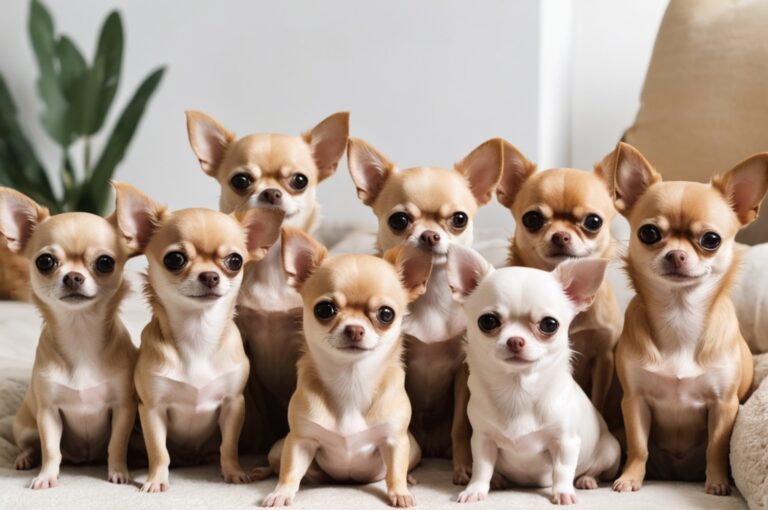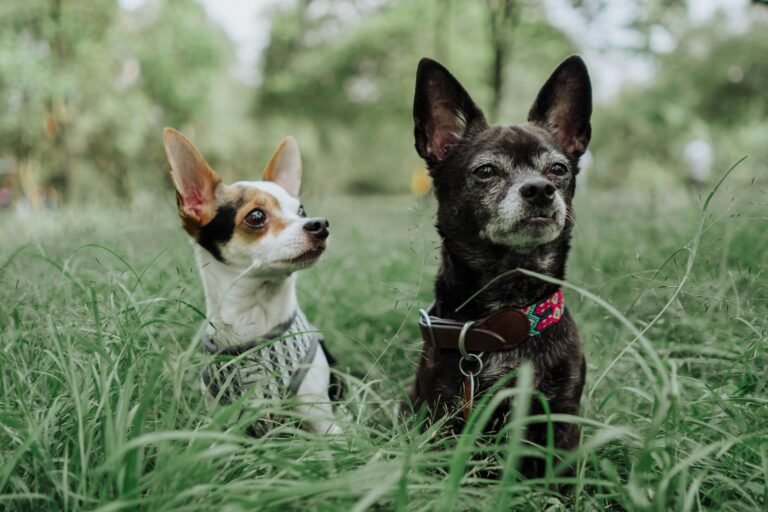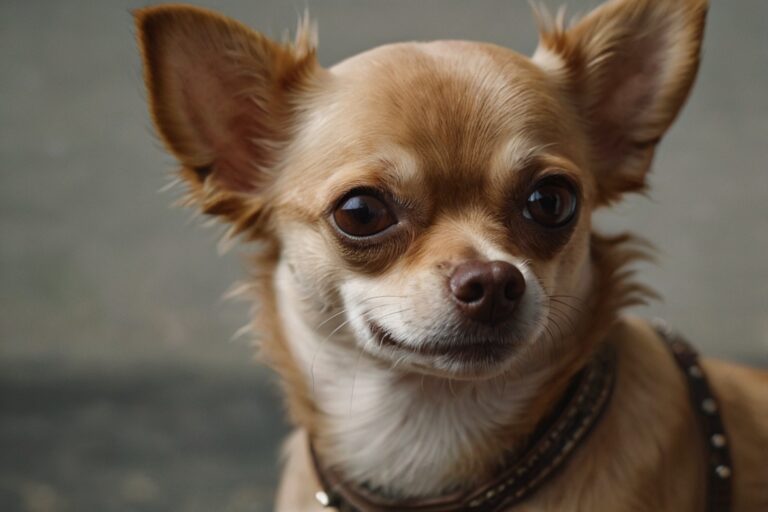How to Select a Healthy Chihuahua for Breeding

Selecting a healthy Chihuahua for breeding is one of the most critical decisions breeders can make. The health and genetic quality of the breeding pair directly impact the quality of the puppies and the long-term success of a breeding program. A well-chosen Chihuahua will not only be healthier but also contribute positively to the breed, reducing the risk of passing on hereditary health issues. In this guide, we will explore the essential factors you need to consider when selecting a Chihuahua for breeding, from physical health to genetic screenings and temperament assessments.
1. Importance of Selecting the Right Chihuahua for Breeding
Choosing the right Chihuahua for breeding goes beyond simply picking a dog that looks good or fits the breed standard. The dog’s health, genetics, and overall well-being are the foundations of a successful breeding program. Ignoring these critical elements can lead to long-term health complications in the puppies and jeopardize the integrity of your breeding program. Health should always come first when making breeding decisions, and breeders must be aware of the potential long-term impacts.
1.1 Why Health is the Foundation of a Successful Breeding Program
Health is the cornerstone of any breeding program. A Chihuahua’s ability to reproduce successfully and deliver healthy puppies is directly related to its overall physical condition. Breeding an unhealthy dog may result in weaker litters, lower survival rates, and increased veterinary costs. Furthermore, unhealthy puppies can develop long-term health problems, leading to dissatisfaction from buyers and a tarnished reputation for the breeder.
Healthy Chihuahuas are more likely to have smooth pregnancies and healthy litters. Their puppies will have fewer chances of inheriting diseases or genetic conditions, making them more desirable to potential owners. Breeders who prioritize health in their breeding stock can build a strong reputation for producing robust, well-tempered, and healthy Chihuahuas, ensuring the long-term success of their breeding program.
1.2 Long-Term Impacts of Poor Health on Puppies and Breeding Programs
Breeding unhealthy Chihuahuas can have serious long-term consequences, both for the puppies and for your breeding program. Puppies born from sick or genetically compromised parents may develop chronic health problems, such as heart defects, skeletal issues, or neurological disorders, which not only affect their quality of life but can also lead to high veterinary costs for the new owners. This can result in negative feedback or reviews, which can harm your reputation and reduce trust in your breeding practices.
Additionally, poor health in the breeding dogs can weaken future generations of puppies, compounding health issues and reducing the viability of your program. Responsible breeders aim to improve the breed with every litter, not degrade it by ignoring health issues. By selecting Chihuahuas with clean bills of health, you ensure that your breeding program remains sustainable, respected, and successful over time.
1.3 Financial and Emotional Costs of Breeding Unhealthy Dogs
The financial costs of breeding unhealthy Chihuahuas can be substantial. Veterinary bills for treating genetic disorders or pregnancy complications can add up quickly, and the potential loss of puppies due to health issues can represent a significant financial setback. Additionally, dealing with chronic health problems in your breeding dogs can increase overall maintenance costs, reducing the profitability of your breeding program.
Beyond financial costs, there is also an emotional toll to consider. Watching puppies suffer from preventable health conditions or losing litters due to genetic defects can be emotionally draining for breeders. It’s heartbreaking to face these problems, especially knowing they could have been avoided by selecting healthier breeding stock. Investing in the health of your breeding dogs from the start saves you both financial and emotional strain in the long run.
1.4 Ethical Considerations in Breeding Healthy Chihuahuas
Breeders have a responsibility to the breed and the dogs they produce, which is why ethical considerations must always be part of the selection process. Breeding unhealthy dogs, even unintentionally, can cause unnecessary suffering for both the dogs and their future owners. Ethical breeders prioritize the well-being of their breeding stock, ensuring that only dogs with good health, sound temperament, and no genetic issues are selected for breeding.
Choosing healthy Chihuahuas for breeding is not just about producing the most desirable puppies—it’s about upholding the integrity of the breed and contributing positively to its future. An ethical breeding program seeks to improve the health, behavior, and characteristics of the Chihuahua breed with each generation.
2. Physical Health Criteria for a Breeding Chihuahua

When selecting a Chihuahua for breeding, physical health should be at the top of your checklist. A dog’s physical condition, including its weight, joint health, dental hygiene, and body structure, plays a critical role in determining whether it is fit for breeding. A healthy body ensures smooth pregnancies, easier whelping, and healthier puppies. Ensuring that your breeding dogs meet certain physical health standards can prevent complications down the line and ensure long-term success in your breeding program.
2.1 Key Physical Traits to Look for in a Breeding Chihuahua
When evaluating a Chihuahua’s physical traits for breeding, look for a dog with a well-balanced, compact body, correct conformation, and sound structure. Conformation refers to how closely the dog’s physical appearance matches the breed standard. A Chihuahua that has a well-formed head, correct proportions, and a solid, muscular build is more likely to pass on these desirable traits to its offspring.
The Chihuahua’s overall body condition should be sturdy, with no signs of physical weakness or deformities. Pay attention to the alignment of the legs, spine, and hips, as skeletal issues can be passed on to puppies. A Chihuahua with a strong, healthy frame will have an easier time carrying and delivering puppies, ensuring a smoother breeding process for the dam.
2.2 Importance of a Healthy Weight and Body Condition
Maintaining a healthy weight is critical for breeding Chihuahuas. Both underweight and overweight dogs can experience complications during pregnancy and whelping. An underweight Chihuahua may not have the necessary strength or body reserves to support a healthy pregnancy, while an overweight dog is at higher risk for dystocia (difficult labor) and other complications.
A breeding Chihuahua should have an ideal body condition, where its ribs can be felt without excess fat, and its waist is visible from above. Monitoring the dog’s weight and adjusting its diet accordingly can help maintain the optimal body condition for breeding. Regular exercise is also important to keep the dog fit and in good physical health, which can contribute to a smoother pregnancy and delivery.
2.3 Assessing Joint Health and Mobility
Joint health is an important factor when selecting a Chihuahua for breeding, particularly because small breeds like Chihuahuas can be prone to joint issues such as patellar luxation (dislocated kneecap). A Chihuahua with good joint health will have proper mobility, allowing it to move smoothly without signs of discomfort or stiffness.
Before breeding, assess the dog’s movement and gait. Look for signs of limping, uneven walking, or difficulty jumping and climbing stairs. Dogs with joint problems may struggle during pregnancy or whelping, and these issues can be passed on to their offspring. Regular joint health checks by a vet, combined with appropriate exercise and nutrition, can help maintain joint health in breeding dogs.
2.4 Dental Health in Chihuahuas and Its Impact on Breeding
Dental health is often overlooked in breeding evaluations, but it plays a significant role in a dog’s overall well-being. Chihuahuas are prone to dental issues such as gum disease, tooth decay, and early tooth loss, which can lead to infections or other health complications. Poor dental health can also affect a dog’s ability to eat properly, which in turn can impact its body condition and overall reproductive health.
Before breeding, ensure that your Chihuahua has strong, healthy teeth and gums. Regular dental check-ups and cleanings are essential to maintaining oral hygiene, which will contribute to the dog’s long-term health and its ability to raise healthy puppies.
This covers the first two points of the article on selecting a healthy Chihuahua for breeding. These sections provide insights into the importance of health and the physical criteria necessary for breeding success. Let me know if you’d like to continue with more sections!
3. Genetic Screening and Health Tests for Breeding

One of the most critical steps in selecting a healthy Chihuahua for breeding is ensuring that the dog is free of genetic disorders and hereditary health issues. Genetic screening helps breeders identify potential health risks that may be passed on to future generations, ensuring healthier litters and reducing the chances of serious illnesses in the puppies. In this section, we will explore the various genetic disorders that Chihuahuas are prone to, the role of DNA testing, and the importance of health certifications in breeding.
3.1 Common Genetic Disorders in Chihuahuas to Screen For
Chihuahuas, like many purebred dogs, are susceptible to several genetic disorders that can affect their overall health and quality of life. Some of the most common genetic conditions seen in Chihuahuas include patellar luxation (dislocated kneecap), heart problems such as mitral valve disease, and neurological issues like hydrocephalus (fluid buildup in the brain). These conditions can significantly impact the dog’s well-being and may even result in early death or the need for lifelong medical care.
When selecting a Chihuahua for breeding, it is essential to screen for these common genetic disorders through specific health tests. Identifying and avoiding dogs that carry these harmful genes can help ensure that future generations of puppies are healthier and less prone to hereditary conditions. Genetic testing allows breeders to make informed decisions and reduce the risks of passing on these diseases.
3.2 The Role of DNA Testing in Ensuring Healthy Litters
DNA testing is a valuable tool for breeders who want to ensure that their breeding stock is free of genetic diseases. By analyzing the dog’s DNA, breeders can determine whether the Chihuahua carries any recessive genes that could lead to health issues in their offspring. This type of testing can detect carriers of genetic disorders, even if the dog itself does not show any signs of illness.
For example, a Chihuahua may carry a gene for a disease like progressive retinal atrophy (PRA), which can lead to blindness but may not exhibit symptoms until later in life. Through DNA testing, breeders can identify whether a dog carries this gene and avoid pairing it with another carrier, reducing the risk of producing affected puppies. DNA testing provides peace of mind and ensures the long-term health of your breeding program.
3.3 Health Certifications Required for Breeding Chihuahuas
In addition to DNA testing, breeders should obtain health certifications for their breeding Chihuahuas to prove that they are free of specific genetic conditions. Certifications from recognized organizations like the Orthopedic Foundation for Animals (OFA) or the Canine Eye Registration Foundation (CERF) are essential in establishing the health credentials of your breeding dogs. These certifications show that your dogs have been evaluated and cleared of certain health issues that are common in Chihuahuas.
For instance, the OFA certification for patellar health ensures that your Chihuahua’s joints are stable and free from luxation. The CERF certification ensures that your dog’s eyes are healthy and free from hereditary diseases like cataracts. Having these health certifications not only protects your breeding program but also reassures potential puppy buyers that your dogs come from healthy lines.
3.4 Identifying Carriers of Recessive Traits and How to Manage Breeding
It’s crucial for breeders to understand how recessive traits work when selecting Chihuahuas for breeding. A Chihuahua may be a carrier of a genetic disorder without showing any symptoms, but when paired with another carrier, there’s a risk of producing affected puppies. This is particularly important in breeds like Chihuahuas, where certain recessive genetic conditions can be prevalent.
To manage this risk, breeders should avoid mating two carriers of the same genetic disorder. By using DNA testing and screening tools, you can identify carriers and carefully plan your pairings to ensure that your breeding program does not produce puppies with inherited diseases. In cases where both parents are carriers, it’s essential to reconsider the pairing or use a different stud or dam to prevent passing on the harmful genes.
4. Temperament and Behavioral Health in Breeding Chihuahuas

In addition to physical health and genetic screening, a Chihuahua’s temperament and behavioral health are critical factors to consider when selecting a dog for breeding. A well-tempered dog is more likely to produce puppies with stable and friendly personalities, making them desirable to future owners. Moreover, breeding dogs with good behavioral health reduces the risk of aggression, anxiety, and other problematic traits being passed down to the next generation.
4.1 Importance of Temperament Testing in Breeding Dogs
Temperament testing is an essential part of selecting a Chihuahua for breeding. Chihuahuas are known for their big personalities, but it’s important to ensure that the dogs used for breeding are well-balanced, friendly, and free from behavioral issues like excessive aggression or extreme shyness. Dogs with stable temperaments are easier to manage during the breeding process and tend to produce puppies that are more adaptable to new homes.
A dog’s temperament can be influenced by both genetics and environment, so it’s important to assess how the Chihuahua behaves in different situations. Are they confident, calm, and social, or do they show signs of anxiety or nervousness? Breeding dogs with sound temperaments helps ensure that the puppies are well-suited for family life and have fewer behavioral problems as they grow.
4.2 Identifying Behavioral Red Flags Before Breeding
Before breeding a Chihuahua, it’s important to watch for behavioral red flags that could indicate underlying issues. For example, a Chihuahua that exhibits aggression towards other dogs or people may not be suitable for breeding, as this behavior could be passed down to future puppies. Similarly, dogs that are excessively fearful or anxious may struggle to adapt to new environments, which can make the breeding process more stressful and lead to puppies with similar traits.
Behavioral problems like excessive barking, possessiveness, or separation anxiety should be carefully considered before deciding to breed. While some of these behaviors can be managed through training, they can also be hereditary, and breeding dogs with these traits could perpetuate the issues in future generations. It’s important to select dogs that are well-adjusted and free from major behavioral concerns.
4.3 Early Socialization: Key to Evaluating Breeding Potential
Early socialization is a crucial factor in determining a Chihuahua’s suitability for breeding. A well-socialized dog will be comfortable in various environments and around different people and animals. This adaptability is important not only for the breeding process but also for ensuring that the puppies will be well-adjusted and socialized from an early age.
When evaluating a Chihuahua for breeding, consider how well the dog interacts with others. Does it react positively to new experiences, or does it exhibit fear or aggression in unfamiliar situations? A Chihuahua that has been properly socialized from a young age is more likely to pass on positive traits to its offspring, making it a better candidate for breeding.
4.4 Assessing Stress Levels in Chihuahuas and Their Impact on Breeding
Stress can have a significant impact on a Chihuahua’s ability to breed successfully. High stress levels can affect a dog’s fertility, behavior, and overall health, making it more difficult for the dog to carry and raise a healthy litter. Stress can be caused by various factors, including changes in environment, loud noises, or the presence of unfamiliar dogs or people.
When selecting a Chihuahua for breeding, it’s important to assess how the dog handles stress. A Chihuahua that becomes easily overwhelmed or anxious in stressful situations may struggle during the breeding process, leading to complications or a poor outcome. Breeding dogs should be calm, resilient, and able to handle the physical and emotional demands of pregnancy and whelping. Ensuring that your dog is in a stress-free environment and providing proper care can help reduce the negative impact of stress on the breeding process.
This covers the next two points of the article on selecting a healthy Chihuahua for breeding. These sections focus on genetic screening and the behavioral aspects that influence breeding success. Let me know if you’d like to continue with more sections!
5. Age and Timing: When to Breed a Chihuahua

Determining the right age and timing for breeding a Chihuahua is crucial for the health of both the mother and the puppies. Breeding a dog that is too young or too old can lead to complications, while breeding during the prime years maximizes the chances of a healthy litter and a smooth pregnancy. Understanding the reproductive life cycle of a Chihuahua will help you decide when to begin and when to retire your breeding dogs.
5.1 Ideal Age to Start Breeding Chihuahuas
The ideal time to start breeding a female Chihuahua is when she reaches full physical maturity, usually between the ages of 1.5 to 2 years. Breeding too early, before the dog is physically developed, can lead to complications in pregnancy and delivery. While Chihuahuas may go into heat as early as 6 months old, it’s essential to wait until they have grown into their adult bodies before attempting to breed them.
For male Chihuahuas, breeding can start a bit earlier, typically around one year of age, as long as they have reached full sexual maturity. However, it’s still important to assess their physical and mental readiness, as early breeding can sometimes lead to behavioral problems or stress.
5.2 Evaluating Reproductive Health as a Chihuahua Ages
As Chihuahuas age, their reproductive health begins to decline, which can impact fertility and the overall health of any future litters. For females, the risk of complications during pregnancy and delivery increases with age, particularly after the age of six. Fertility may also decline, resulting in smaller litters or difficulty conceiving. For this reason, many breeders choose to retire female Chihuahuas from breeding by the age of six or seven.
Male Chihuahuas can typically breed longer than females, but their fertility may also decrease with age. It’s essential to monitor their overall health and ensure they remain capable of producing healthy litters. Breeding older males should be done with caution, and regular veterinary checkups are recommended to assess reproductive health.
5.3 How to Identify a Chihuahua’s Prime Breeding Years
A Chihuahua’s prime breeding years are typically between the ages of 2 and 5. During this time, both males and females are most fertile, and their bodies are well-equipped to handle the demands of pregnancy, delivery, and nursing. Breeding within this window maximizes the chances of successful conception, healthy puppies, and fewer complications during whelping.
During these prime years, it’s important to maintain a consistent breeding schedule that allows for adequate rest between litters. For females, this means skipping at least one heat cycle between pregnancies to give their bodies time to recover fully.
5.4 Risks of Breeding Too Young or Too Old
Breeding a Chihuahua that is too young or too old can result in serious health risks. Breeding a female Chihuahua too early, before she reaches physical maturity, can lead to problems such as underdeveloped puppies, difficulty delivering the litter, and even increased mortality for both the mother and the puppies. Similarly, breeding a Chihuahua that is too old can result in complications such as dystocia (difficulty giving birth), higher risks of miscarriage, or smaller, less healthy litters.
For males, breeding too young may lead to behavioral issues, such as stress or anxiety, and they may not yet be fully fertile. Breeding too old, on the other hand, can result in decreased sperm count and lower-quality semen, which may affect the health and viability of the litter.
6. Pre-Breeding Veterinary Checkups and Routine Care

Before breeding a Chihuahua, it is essential to ensure that the dog is in optimal health through comprehensive veterinary checkups. Regular care and preventive treatments play a crucial role in ensuring that your breeding dog is physically prepared for pregnancy and whelping. A pre-breeding vet visit can identify any underlying health issues and give you peace of mind before proceeding with the breeding process.
6.1 Essential Pre-Breeding Health Examinations
Pre-breeding veterinary exams are critical to evaluating the overall health of a Chihuahua. These exams include a thorough physical check-up, blood tests to assess the dog’s organ function, and a review of their vaccination and medical history. During the examination, the vet will evaluate the dog’s weight, heart, lungs, and reproductive organs to ensure there are no underlying health concerns that could complicate breeding.
Additionally, the vet will often conduct a reproductive health check to ensure that the female Chihuahua’s uterus and ovaries are healthy and that the male Chihuahua’s sperm count and motility are adequate for breeding.
6.2 Vaccinations and Preventative Care Before Breeding
Before breeding, it’s essential to ensure that all of your Chihuahua’s vaccinations are up to date. Vaccinations for common canine diseases like distemper, parvovirus, and rabies are critical to the health of the breeding dog and the puppies. If a Chihuahua is not fully vaccinated, there is a risk of disease transmission during pregnancy or to the puppies after birth.
In addition to vaccinations, preventative care measures such as flea, tick, and worm treatments should be administered to protect both the mother and the puppies. A healthy, parasite-free environment will ensure that the breeding process runs smoothly and that the puppies are born healthy.
6.3 Parasite Control and Its Impact on Breeding Health
Parasites such as fleas, ticks, and intestinal worms can have a significant impact on the health of a breeding Chihuahua. These parasites can cause malnutrition, anemia, and other health complications, which can, in turn, affect fertility and pregnancy outcomes. Ensuring that your breeding dog is on a regular parasite prevention program will help protect their health and the health of their future puppies.
Breeders should administer monthly flea and tick preventatives and regularly deworm their Chihuahuas to maintain their overall health. A veterinary checkup before breeding can confirm that your dog is free of parasites and ready for pregnancy.
6.4 Nutritional Preparations for a Breeding Chihuahua
Proper nutrition is key to preparing a Chihuahua for breeding. Feeding your dog a well-balanced, high-quality diet ensures that they have the necessary nutrients to support fertility and a healthy pregnancy. Breeding dogs may also benefit from supplements like folic acid, omega-3 fatty acids, and prenatal vitamins to support reproductive health and improve their chances of a successful pregnancy.
Before breeding, consult with your vet to ensure that your Chihuahua’s diet is optimized for breeding. Adjustments may be needed to account for the increased nutritional demands of pregnancy and nursing, ensuring both the mother and puppies receive adequate nutrition.
Conclusion
Selecting a healthy Chihuahua for breeding involves careful consideration of multiple factors, from physical health and genetic screening to temperament and veterinary care. A well-chosen breeding dog ensures not only the success of your breeding program but also the health and well-being of future generations of puppies. By prioritizing the health, behavior, and reproductive fitness of your Chihuahuas, you can build a strong foundation for ethical, responsible breeding.
From the early stages of selecting the right age for breeding to ensuring proper nutrition and veterinary care, breeders must remain vigilant in maintaining the highest standards of health and care. By doing so, you will not only produce healthier litters but also contribute positively to the Chihuahua breed as a whole, ensuring its long-term vitality and popularity among dog lovers.






